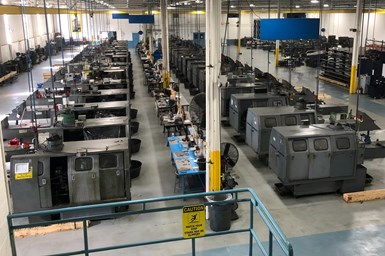
Be sure to take measures to ensure any used equipment you intend to purchase does not have liens on it. (Photo credit: PM)
It’s not uncommon for companies to buy used equipment, and the current used equipment market is robust — especially with today’s supply chain hiccups. But there is a rare, yet important issue with all used equipment that you should be aware of, and that’s whether or not your intended purchase has a lien on it.
Imagine finding a great deal on a used machine tool another company is selling. Everything looks to be in order given that the selling company has owned it for numerous years and it’s fully paid off, so you buy it.
Months later, you are contacted by the selling company’s bank. The seller is going out of business and has defaulted on some of its loans. The bank says the machinery you bought, despite being fully owned by the seller, remained part of a blanket lien and the bank is claiming ownership. Your lawyer confirms that the law supports the bank’s claim.
The end result is you lose the equipment you purchased and the money used to pay for it unless the going-out-of-business company will make good on it. Although this scenario is rare, it is something that is possible when buying used equipment, especially when buying from a non-dealer, private seller.
One of the first things any buyer should be aware of when purchasing a piece of used equipment is whether the equipment has a lien on it or not. This is generally confirmed with a Uniform Commercial Code (UCC) search, which should turn up most liens.
Who can conduct a UCC survey varies. An authorized dealer or reseller typically has already conducted one as a condition of acquiring it. If you are borrowing money and financing the purchase, your lender might conduct one. And your seller might have performed one to show that the equipment’s title is clean. If none of these are true, you should conduct one yourself.
That said, a UCC search does not guarantee a clean title as nothing can guarantee a clean title on any piece of used equipment. There are several reasons for this. One is that paper trails on used equipment can get choppy, especially if the piece of equipment has changed hands several times. Another is the immense amount of variables in these searches, such as location/jurisdiction searched, similar company names, serial numbers entered manually and so on. There’s a lot of room for error.
However, the biggest reason is blanket liens. A blanket lien is when a lender, typically a bank, puts a lien on all the assets a borrowing business owns. This means if a company borrows money to buy, say, a new truck, all of its tangible assets, even ones they’ve owned free and clear for years, now have a lien on them. And anything with a blanket lien on it cannot be sold without the bank’s permission. Blanket liens, a standard bank clause, is often buried in fine print, so they tend to be out of sight/out of mind.
Note that if your company currently has an open bank loan, it’s very likely everything your company owns has a lien on it and can’t be sold without permission. And everything mentioned can go back to all previous owners. A blanket lien from two or three owners ago is still valid.
One way to protect yourself from purchasing used equipment that has a lien on it is to buy from an authorized reseller or dealer. This usually mitigates most issues, as they will typically conduct the UCC search and will also usually stand behind the equipment’s title being clean if an issue does arise. When buying from a dealer, ask about whether they will assume responsibility for any unforeseen liens.
If you’re buying from a non-dealer, private seller, first make sure a UCC search is done. If you have to do it yourself, so be it. Next, have all paperwork for the equipment in hand, including all bills of sale and similar, and make sure the paper trail goes all the way back to the manufacturer. Buying used equipment from the original owner makes everything easier, as the trail gets muddier with each subsequent owner. (Personally, I would pass on any equipment with a broken or unknown paper trail.) But ultimately, you’re simply going to have to trust the seller’s word.
Used equipment sales happen all the time, and an overwhelming percentage of them go off without a hitch. Trusting the seller and having a thorough UCC search with full paper trail can go a long way to alleviate issues. Always remember, though, it is the buyer who is ultimately responsible.
About the Author
Dan Furman
Dan Furman is the vice president of strategy at Crest Capital, which provides small and mid-sized companies financing for new and used equipment, vehicles and software, as well as offering equipment sellers a risk-free financing program.
Read Next
5 Aspects of PMTS I Appreciate
The three-day edition of the 2025 Precision Machining Technology Show kicks off at the start of April. I’ll be there, and here are some reasons why.
Read MoreA Tooling Workshop Worth a Visit
Marubeni Citizen-Cincom’s tooling and accessory workshop offers a chance to learn more about ancillary devices that can boost machining efficiency and capability.
Read MoreDo You Have Single Points of Failure?
Plans need to be in place before a catastrophic event occurs.
Read More













.jpg;maxWidth=300;quality=90)





